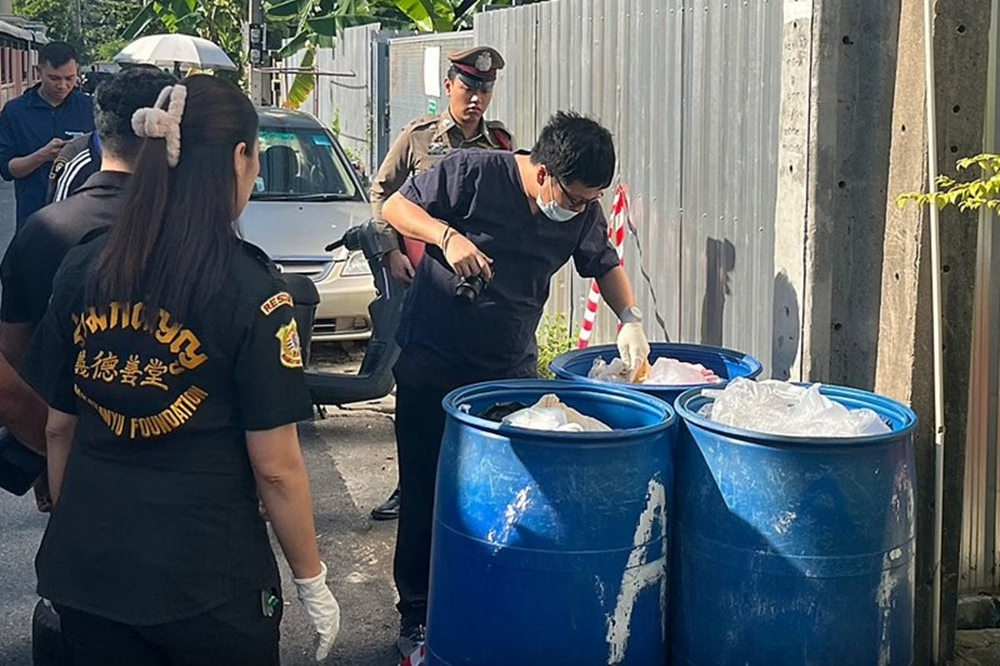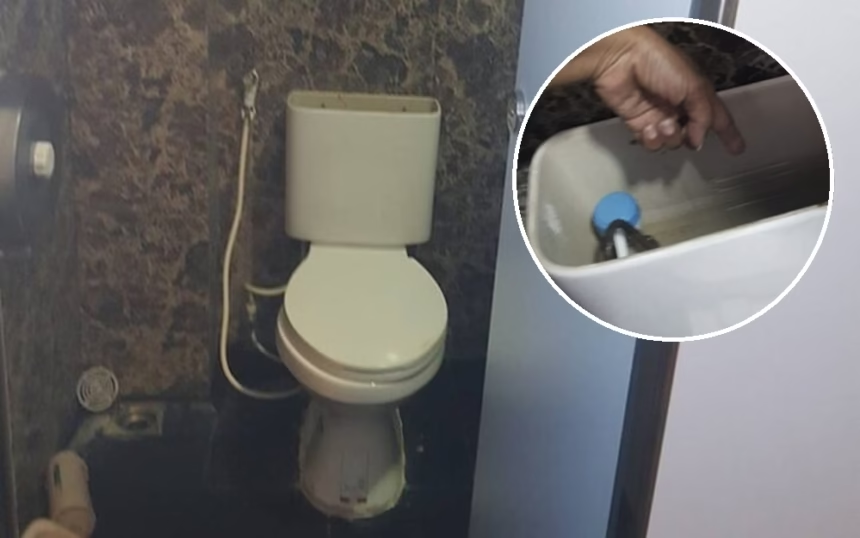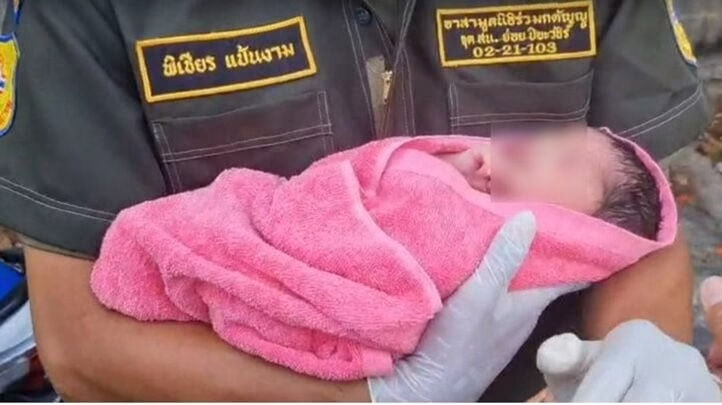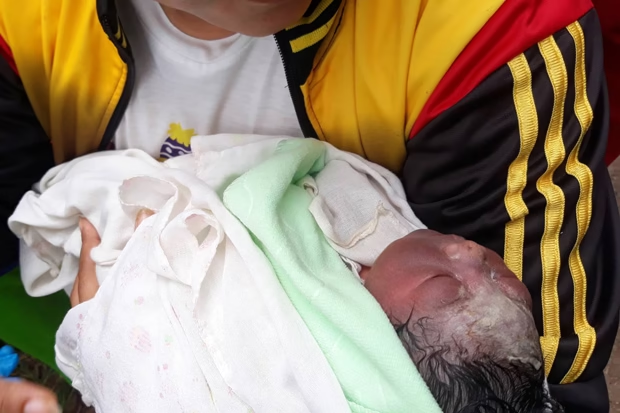BANGKOK– In a distressing case that has shaken residents of Lat Krabang district, a newborn baby girl was found alive inside the toilet cistern of a third-floor bathroom in a run-down apartment block on Soi Lat Krabang 54.
The child, believed to be only a few hours old, was discovered by a maintenance worker who heard faint cries while checking the plumbing. Police officers and rescue workers arrived quickly, removed the baby from the water, and rushed her to Lat Krabang Hospital for urgent treatment.
Hospital staff reported that the baby weighed around 2.5 kilogrammes and showed clear signs of hypothermia and dehydration after being left in cold water for an unknown time.
“Her skin was bluish from the cold and she had small scratches, but her vital signs became stable soon after treatment,” said Dr Naree Srisuk, the paediatrician on duty.
The umbilical cord was still attached and roughly cut, which suggests a sudden birth without medical help. Investigators believe the mother delivered the child in the same bathroom, then placed her in the cistern to hide the birth.
The baby is now in intensive care, using oxygen to assist her breathing. Doctors expect her to survive, but say she will need long-term follow-up to check for any lasting health problems.
Child protection officers have taken legal custody of the infant, and police are trying to trace the mother through DNA analysis and security camera footage from the building.
The old apartment complex, which houses low-income migrant workers and university students, has been sealed off while forensic teams search for traces of blood or other evidence. Several neighbours admitted they had heard faint crying earlier that day but had ignored it. Many thought the sound came from stray cats that often roam the corridors.
“I did not think it was a baby at all, not until the worker shouted for help,” said a 28-year-old factory worker who lives on the same floor and asked not to be named.

Dead Newborn Boy Found in Lak Si, Bangkok
The Lat Krabang rescue comes soon after another tragic case of infant abandonment in Bangkok. On 1 November 2025, two weeks before the latest discovery, a newborn boy was found dead in a black plastic bag thrown into a rubbish bin behind a shopping centre in the Lak Si district.
The boy, who appeared fully developed, had been wrapped in a bloodstained towel and left to suffocate and freeze, according to a report from Police General Hospital. No placenta or remains of the umbilical cord were at the scene, which indicates that the birth took place somewhere else.
Bangkok Metropolitan Police say both incidents show similar patterns, with newborns left in hidden spots in public or semi-public areas.
“These are not random events. They appear to be desperate acts by mothers who feel they have no other choice,” said Pol Col Thanawat Phrommee, the chief investigator in the Lak Si case.
CCTV footage in Lak Si captured a young woman, thought to be in her early twenties, placing the bag in the bin around midnight. Her identity is still unknown. Police have offered a reward of 50,000 baht for information that leads to her arrest.
Thailand’s Mental Health Strain and the Roots of Abandonment
Specialists link these cases to Thailand’s growing mental health problems, especially among young, unmarried mothers who face social shame and financial stress.
Data from the Department of Mental Health (DMH) shows that up to 20% of new mothers in Thailand suffer from postnatal depression. Rates are even higher in poor urban areas where prenatal care is limited or missing.
A DMH report from 2024 estimated that more than 1.5 million people in Thailand live with depression each year, yet only around 200,000 receive treatment. One major reason is a shortage of staff. Thailand has only 0.9 psychiatrists per 100,000 people, far below the global average.
Psychiatrist Dr Apichai Mongkol from Chulalongkorn University says that some mothers who abandon their babies may be in a state of severe mental crisis.
“Postpartum psychosis, linked to unplanned pregnancy, poverty, or violence at home, can break a woman’s sense of reality,” he explained. “Many fear harsh judgement from family and neighbours, especially in conservative communities where being a single mother is still a taboo.”
Child welfare agencies in Bangkok record more than 100 abandoned infants each year. Many are found in toilets, rubbish bins, or public parks, places chosen for a quick escape rather than any clear plan to injure the child.
A range of social factors feeds the problem. Comprehensive sex education is still lacking in many schools.
A 2023 UNICEF study found that 15% of Thai teenagers had unprotected sex. Economic pressure adds to the risk. Migrant workers in areas such as Lat Krabang may earn only 300 baht per day, far below what is needed to cover baby formula, nappies, and health care.
“Abandonment is often a cry for help, not a sign of pure cruelty,” said Social Development Minister Varawut Silpa-archa. He has promised more funding for crisis hotlines and safe drop-off points, similar to the “baby hatch” systems used in some European countries.
Public Outcry and Demands for Change
The Lat Krabang and Lak Si cases have sparked fierce debate across social media, with hashtags such as #SaveThaiBabies trending among Thai users. Many people express anger and sadness, while others call for more support for vulnerable mothers rather than harsher punishment.
Groups like the Foundation for Women say Thailand needs stronger mental health screening in antenatal and postnatal clinics, and legal options that allow parents to leave unwanted babies safely without fear of criminal charges.
“We must respond with empathy, not only with arrests and condemnation,” said the foundation’s director, Nareeluc Pairchaiyapoom.
Police continue to appeal for information about both cases and urge anyone who knows the mothers or saw suspicious behaviour around the time of the incidents to call the 191 hotline. People can give tips without revealing their names.
As the investigations move forward, the survival of the baby girl in Lat Krabang and the death of the boy in Lak Si highlight a pressing national issue. Thailand faces a clear choice: either confront its mental health and social care gaps, or see more newborns pay the price for problems they never created.
















